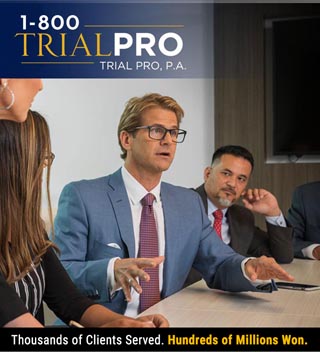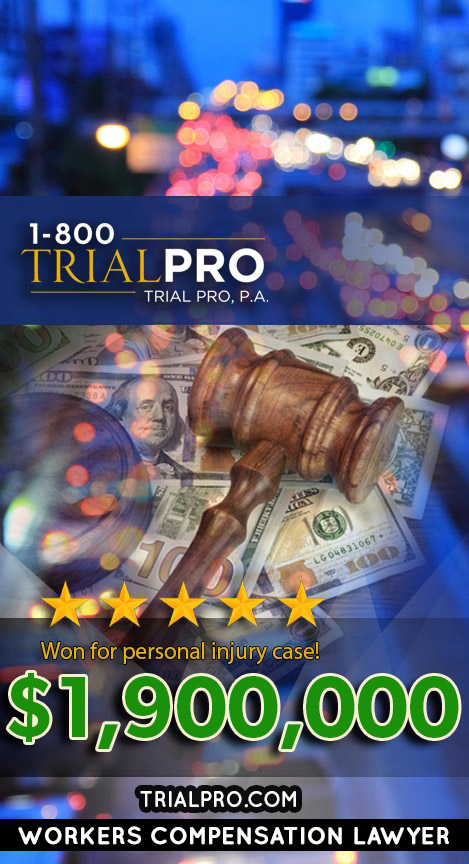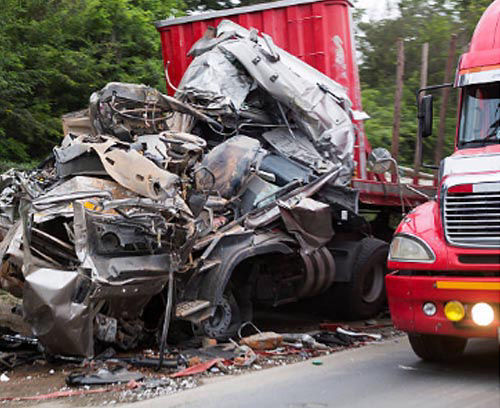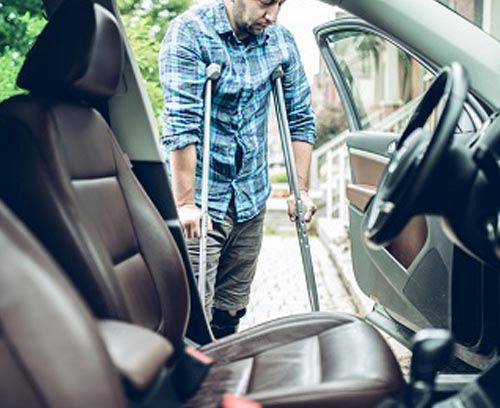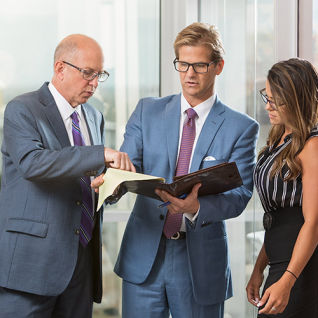After experiencing an accident in Naples, the last thing you want is to have an attorney at hand that doesn't know how to represent you adequately. You want a reputable Naples law firm that will fearlessly fight to acquire maximum compensation on your behalf. That is precisely what Trial Pro, P.A. does. Our Naples lawyers hold a strong reputation for winning cases, and we do everything in our power to deliver the results you're expecting.

Trial Pro, P.A. is a Collier County, Florida, worker's compensation law firm. Our team of experienced lawyers has extensive knowledge of worker's compensation cases and is dedicated to representing those injured. We firmly believe in fighting for the rights of injured workers and will not rest until we have secured the compensation they deserve.
Worker's compensation cases can be complex and confusing, making it difficult for individuals to navigate the legal system independently. You must hire an attorney with the knowledge and experience to represent you effectively. Our lawyers have handled countless worker's compensation cases and are well-versed in the laws and regulations that govern them.
You may be entitled to worker's compensation benefits if you have been injured on the job. These benefits include medical expenses, lost wages, and other related costs. However, it is essential to note that the worker's compensation system is designed to protect employers and insurance companies, not the injured workers. This is why it is crucial to have a skilled attorney on your side fighting for your rights.
At Trial Pro, P.A., we know every case is unique, so we provide personalized attention to each client. We understand the emotional and financial toll a workplace injury can have on you and your family, so we are committed to making the legal process as stress-free as possible.
Our team serves clients throughout Collier County, including Naples, Marco Island, and Immokalee. We also represent clients in the surrounding counties of Lee, Hendry, and Charlotte.
When you choose Trial Pro, P.A. as your legal representation, you can rest assured that we will use every tool to fight for your rights. We will aggressively negotiate with insurance companies and employers to ensure you receive the maximum compensation. If necessary, we are prepared to take your case to trial and present the most robust case to a judge and jury.
If you have been injured on the job in Collier County or the surrounding areas, you need an experienced worker's compensation lawyer to represent you. Don't wait another day; contact Trial Pro, P.A. today to schedule a free consultation and learn how we can help you receive your deserved compensation.


Florida workers' compensation law covers a broad range of injuries, including physical injuries, mental health disorders, repetitive motion injuries, and occupational illnesses. These injuries can range from minor cuts and bruises to severe, life-altering injuries such as spinal cord injuries, traumatic brain injuries, and amputations. Fortunately, Florida workers' compensation benefits can provide you with necessary medical care, lost wages, and, in some cases, disability compensation.
Collier County is home to some of Florida's largest employers, such as Arthrex Inc., NCH Healthcare System, and Collier County Public Schools. Other nearby cities such as Naples, Bonita Springs, Cape Coral, and Fort Myers also have a significant number of workers who are eligible for workers' compensation benefits following a work-related injury.
If you or a loved one has suffered a work-related injury in Collier County or nearby cities, you should contact us today. Our experienced workers' compensation attorneys will guide you through the complex process of obtaining benefits and help you get the compensation you deserve. We understand how stressful and overwhelming it can be to deal with a work injury, and we are here to help. Don't hesitate to reach out to us today to schedule a free consultation.


Trial Pro P.A. is proud to advocate for workers compensation victims all over the state of Florida, including our office in Collier County. Our dedicated experienced personal injury attorneys handle a range of legal matters, from employment disputes to auto accidents claims. We can use our knowledge and legal skills to help you not only achieve a favorable outcome, but relieve the legal burden from your shoulders as well. Our entire team understands how challenging and confusing litigation can be, which is why we are here for you through every step of the process. Serving all areas of Florida including Orlando, Ocoee, Apopka, Orlovista, Rio Pinar, College Park and more!
Frequently Asked Questions About Workers Compensation in Collier County, Florida
- Can you work while on workers compensation?
- Can you sue workers compensation for pain and suffering?
- Can you be fired for being injured on the job?
- Can The Internal Revenue Service take a workers compensation settlement?
- Can I get unemployment if I get hurt at work?
- Can I sue my employer for emotional distress?
- Do workers comp Insurance Companies Pay For Lost Wages?
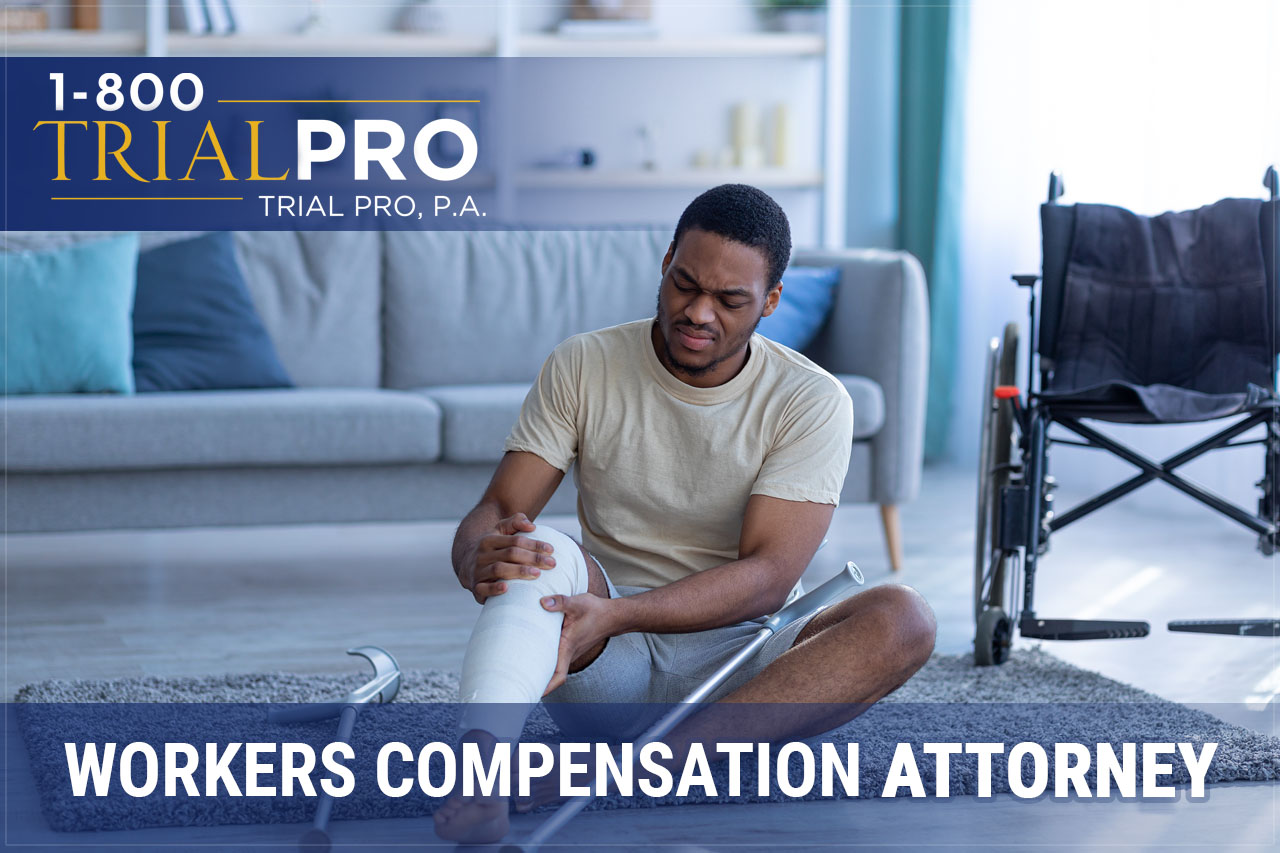
Florida law requires most employers to buy workers' compensation insurance coverage. Under Florida workers compensation laws, employees are compensated for occupationally sustained injuries, despite fault. This insurance coverage makes companies immune from some injury suits by workers.
Experienced Collier County Workers' Compensation Attorneys Who Know How to Succeed In Tough Lawsuits
Are you searching for a Work Comp Lawyers near you? If you are injured, we recognize you may not be able to drop by our offices. Let us go to your place!
Trial Pro, P.A. works with Floridians in a range of personal injury law matters. Our practice areas include all sorts of injuries; automobile accidents, motorcycle collisions, wrongful death cases, slip-and-fall injuries, eighteen-wheeler accidents, construction injuries and work comp injuries. With offices in Orlando, Tampa, Naples, Brevard County, Melbourne and Fort Myers. Trial Pro, P.A. delivers strategic guidance and counsel to people in areas such as Fruitland Park, South Apopka, Deltona, Kendall, South Fort Myers, Pelican Bay and all throughout Florida. Call our firm for a free and confidential discussion of your case.
Work Comp in Florida is a legally required system of benefits that are readily available to most people who are injured on the job. It is a no-fault system, meaning that for the most part negligence in the root cause of an injury is a non-issue. You can be totally at fault or negligent in leading to an accident, moreover this does not disqualify you from obtaining benefits. However your boss or coworker might be negligent in triggering the injury, and this specific does not entitle you to even more benefits. Work Comp is claimed as being simultaneously a shield and a sword as far as providing for benefits. It is a "sword" because your Workplace can not defend against your claim by saying you were negligent in triggering the injury. It is a "shield" that provides protection to Employers from having to pay laborers a lot of the damages that are readily available to non-employees who are injured or hurt after the accident.
Need to file a Workers' Compensation Claim? Talk with our Expert Collier County, Florida Work Compensation Attorneys Call us today for the powerful representation you and your family needs - 800-874-2577
This instance explains the "sword and shield" factor of Work Comp. Let us's claim Evan is an extremely sloppy baker. He hardly focuses on what he's doing. He's heading out the back entrance at work, hands packed with trash, to throw in the dumpster. As he runs down the well-lit stairs, he trips and falls down damaging his patella. His manager comes to his aid, and observes that Evan once and again was transporting way too much to be safe and his shoe laces were undone. You might probably expect that Evan does not have a claim due to the fact that his neglect induced the accident. But you'd be incorrect.
Collier County businesses and property owners are lawfully liable for looking after their properties and have to keep it in a reasonably safe condition and tell occupants of any unsafe conditions of that they are aware or should be aware.
Now let's alter the facts just a little. Evan rather than being reckless is very vigilant. He always ties his no slip shoes in double knots, never hurries down the stairs, and certainly never carries more than he can. Nevertheless his manager has been relatively slack lately. The lamp on the stairs burned out, and he realizes that one of the steps is broken and is a tripping hazard. Then again he's too busy to take care of that problem now. As a result, Evan trips on the cracked unlit staircase that his employer knew of, and yet didn't even bother to notify Evan about. If you believe that Evan can easily now take legal action against his manager or Employer for negligence due to his boss's negligent behaviors, you would also be off-target. Negligent Evan has the very same rights as a hurt laborer as careful Evan does. That may appear unreasonable, but that is a consequence of fault of negligence being a non-issue in workers' compensation.
So let's examine who is qualified to these benefits in Florida. First of all, you need to be an employee. Independent contractors (or 1099 staff members) are not entitled to work comp benefits. Secondly, the organization that you work for will need to be large enough to be required to possess work comp benefits. On the assumption that there aren't at least four workers, then the Business isn't required to carry worker's compensation insurance coverage unless it is a building and construction job As well, presently there are particular occupations that usually are not protected in The Sunshine State under work comp. Some examples of jobs that are not covered are many real estate agents, owner-operators of trucks, most volunteers, and taxi cab drivers.
Therefore, let's assume you qualify as an employee under the workers' comp system, does that mean that you're entitled to benefits if you sustain injuries or have an accident on the job? Like many legal issues, the answer is that it depends. First off, the accident or personal injury has to "arise out of" and be "in the course and scope" of employment. Arising out of work in essence denotes that some aspect of the job triggered the accident. A good example of a relatively frequent injury occurrence at work that is not usually a work-related accident is a heart attack or stroke. If you're sitting at your desk and you sustain a cardiac arrest during the course of work hrs, this specific is not really going to count as a workers' comp injury. It may have happened at work, but the work did not trigger the cardiac arrest. Whether or not you have an extremely demanding career and you're boss has been harassing you relentlessly and you feature a stroke due partially to the other psychological and mental toll work takes on you, this is not going to be covered. The cardiac arrest, stroke, or other "internal failures " are considered to be personal in nature and not related to your work duties. Because of this the simple fact that the calamity took place at work is not enough. Exceptions to these exclusions arise if: (a) you are involved in an unusual strain or effort at the workplace, or (b) you are involved in an occupation where there is a presumption that such an event is work-related - which include a police officer or fireman.
"In the course and scope of employment" is in addition required for an accident to be protected under Workers Compensation. To be in the course of employment, you literally have to be at work. If you have a vehicle traffic collision either on your way to work or on your way home, the majority of instances those traffic collisionsare not going to be considered job related injuries. There are exceptions. To remain in the scope of employment, you need to be conducting something related to work or even at the very least engaged in some form of reasonable task the Employer could possibly have foreseen. If your employment is to perform paperwork in a business office but you hurt yourself when you and your friend choose to have a run down the staircase to see who's in optimum condition that personal injury is definitely not going to be considered work-related. You have foolishly drifted from your work duties to the point that what you're doing during the time of trauma is no more sufficiently connected to work to get considered work-related.
Therefore, let's say you've cleared the hurdles of being an employee that's injured or hurt in the course and scope of your job by an accident that arose out of work, what do you get? To be entitled to lost wages, you have to miss out a certain amount of workdays and the disability has to last a specific period of time. If you miss barely a few days from your job, you're not going to be given lost wages. Additionally if you have an injury that heals within three full weeks, you're not entitled to temporary benefits. If you do suffer a trauma that manages to keep you out of your job for an extended time, then you will obtain compensation. Nonetheless, this compensation is not your full income. Rather you obtain about two-thirds of what you were earning at the time of the injury. If the medical professional says no work at all, then you get 66.67% of what you were earning at the time of the accident. If the medical professional says you can work with limitations AND the Business is unable to accommodate those limitations, you will get 64% of your paycheck. But if your employer is able to accommodate those limitations and you are making 80% of your pre-injury earnings, you get no reimbursement. So bottom line is that if you are missing work as a result of a work associated accident, you will lose wages. The longer your injury, the more paychecks you can lose. Unless you settle your case eventually, those lost wages are gone for good and will not be recovered.
So let's claim that you've cleared the hurdles of being an employee that's injured or hurt in the course and scope of your job by an injury that arose out of work, what do you get? To be entitled to lost wages, you must miss a particular amount of workdays and the incapacity has to last a specific period of time. If you miss out no more than a week from work, you're not going to get lost wages. Also if you have a trauma that heals within three weeks, you're not qualified to short-term benefits. If you do sustain a trauma that keeps you out of your job for an extended period of time, then you will earn compensation. Nevertheless, this compensation is not your full income. Instead you collect around two-thirds of what you were making at the time of the personal injury. If the health professional says no work at all, then you get 66.67% of what you were making at the time of the injury. If the health care provider claims you can work with restrictions AND the Employer is not able to accommodate those restrictions, you may get 64% of your salary. But if your employer is able to accommodate those limitations and you are making 80% of your pre-injury earnings, you get no reimbursement. So bottom line is that if you are missing your job as a result of a work-related injury, you will lose wages. The greater your impairment, the more earnings you can lose. Unless you settle your case at some point, those lost earnings are gone for good and will certainly not be recovered.
A further restriction on your opportunity to obtain lost wages is that those benefits are just given for a certain period of time. Once you have reached maximum medical improvement, which is the physicians way of stating you're as good as you're going to get, you do not get anymore temporary benefits. Even if you have not come back to work or your position is no longer available, your temporary benefits end. If you receive an impairment rating due to a permanent lesion, you will receive permanent impairment benefits, however those benefits are less than the temporary and they are very short lived. They usually just last a matter of a few weeks or months. Just very few injured workers, the most seriously hurt, have a likelihood of receiving long-term permanent benefits called permanent total disability.
If it pertains to medical care, your rights or benefits also have major constraints. If you have an injury that calls for critical care, at that point you can get that care without first getting Workplace or workers' comp provider authorization. After that early treatment, who you see for medical treatment is not your choice. Your Employer or more frequently its work comp insurance service provider are going to inform you exactly who you can treat with. If you don't prefer the health care provider they pick, then you might get a one time change but that's it. Additionally, you don't have the ability to pick that next medical professional either. Once again the workers comp insurance carrier picks the physician. You can get what is called an IME, or "independent medical doctor", but you have to pay for that doctor out of pocket. Your health insurance won't cover it.
At least one of the few positive elements of the medical care is that you do not pay for it at all, other than a $10 copayment once you reach maximum medical improvement. The insurance company is accountable for all other expenses of treatment including prescription medicine and physical therapy. Still as you have the ability to probably see already, workers' compensation is not an excellent program. It's also a complex system.
If you find yourself in the workers compensation system, you're better off obtaining advice and perhaps a lawyer sooner rather than later. Mistakes made in the workers' compensation system might be challenging if not impossible to unwind. And also some mistakes can guarantee the end of your case altogether. Therefore if you have a workers' compensation injury, speak to us promptly. The consultation is free of charge, and you are under no commitment to retain us. In case you do hire us, you won't be out of pocket for any charges or costs. We only gets paid when we get benefits for our clients!
No Fee Unless Recovery
At Trial Pro, our car accident attorneys work on a contingency fee basis. That means our experts cover the expenses of investigating, building, negotiating and litigating your case. We do not charge you a thing unless our lawyers recover compensation on your behalf. If we don't win your claim, you will owe us nothing at all.
Our Collier County injury lawyers also provide cost-free consultations to study the particulars of your insurance claim and determine if you have a suit. Set Up a Free Assessment
If you or someone you love has been injured due to someone else's negligence or neglectfulness, you need a good attorney by your side who is familiar with the laws and regulations in FL.
Our Collier County personal injury attorneys are skilled in tort litigation and have been acknowledged by our peers for our accomplishments. A few of our legal professionals have been identified as Super Lawyers and notable litigators for their victories in behalf of our clients.
We have recovered favorable judgments and compensations that contributed in assisting our clients recoup from their personal injuries or the loss of a loved one. Let us help you recover the maximum amount of compensation you deserve for your injuries.
Acquiring Compensation for Your Workplace Injury in Collier County Florida
Because workers' compensation is a form of insurance policy, Florida workers compensation insurance typically covers what you would expect your vehicle insurance policy to encompass if you were hurt in an car crash. This workers compensation benefits consists of, yet might not be limited to:
- Medical Bills
- Lost Income
- Prescription Medications
- Clinical Equipment
- Earnings Replacement
- Particular Job Substitute Benefits
The nature as well as degree of your benefits rely on whether your injuries developed no disability, a partial disability, long-term disability or permanent disability.
Workers' Compensation Cases Frequently Asked Questions
- Can I Get Unemployment if I Get Hurt at Work?
- Can I Sue My Employer For Emotional Distress?
- Can The Internal Revenue Service (IRS) take a Workers Compensation settlement?
- Can You be Fired for Being Injured on the Job?
- Can You Sue Workers compensation for pain and suffering?
- Can You Work While on Workers Compensation?
- Do Workers' Compensation Insurance Companies Pay For Lost Wages?
- Do You Get a Settlement from Workers Compensation?
- How Long Do You Have To Report an Injury at Work in Florida?
- What are Common Industrial Accidents and Serious Occupational Injuries
- What Is the Statute Of Limitations On Workers Compensation Claims?
- What is Workers’ Compensation and what does it cover?
- When can you File a Personal Injury Case instead of Worker's Comp?
- 10 Steps To Take After a Work Accident in Florida
